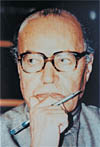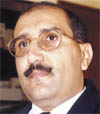Abdullah Melehm: ” Our policy is people serve people.” [Archives:1998/23/Interview]
Mr. Abdullah Melhem, General Manager of Sheraton Sanaa, will be leaving his post soon, following two successful years in Yemen. He is going to be the General Manager of the Sheraton Deera, Dubai.
With a B.Sc. in Civil Engineering and a degree in Marketing Finance and Business Administration, Mr. Melhem, 47, has a 20-year experience in the hotel business. He was the general manager of the Hyatt Regency in Riyadh (1992), Casablanca (until 1996) and then moved to the Sanaa Sheraton.
As a farewell gesture, Bin Sallam of Yemen Times met Mr. Melhem to talked about his tenure in Yemen. He filed the following interview.
Q: When you took over its management, Sanaa Sheraton was not exactly doing very well. Now it is making big business, how do you explain that?
A: I started my work in Sanaa on 11 August, 1996. The situation at the hotel was disheartening, which presented a real challenge that I decided to take up. I became determined to change the image of the Sanaa Sheraton by relying on the ingenuity of the employees and following the tested policy of ‘people serve people.’
If the employee is not happy, the guest will not be happy. My top priority was to make the employee satisfied. For that, you have to train them, take care of them, and teach them how to serve the guest better. Thus, the employee will be able to do his or her work perfectly. When you treat them like mere subordinates, it just does not work.
Q: Could you elaborate?
A: You have to call an employee by name, you have to know about his personal situation, you have to listen to his or her demands, you have to provide him/her with at least the basic requirements, and in short you have to respect the employee in order for him/her to serve you better.
Tangible positive changes started to take place at the Sheraton Sanaa. People began to say, ‘your staff are really self-motivated and providing very good service.’ As a general manager, I cannot work 24 hours a day, so I have to trust my people and to give them confidence. I developed good relations between the administration. For me each employee is as important as the other. If any employee has any claim, I will be more than ready to listen to him/her. When I deliver to the employees what I promise, then I create trust. As an Arab, I know exactly what an Arab employee needs.
Human resource development comes before financial concerns. The dignity of an employee is above all other matters. If he/she works well, you commend him/her in front of everybody. If he/she errs, you talk to them confidentially.
Q: What other new principles have you adopted to make the Sheraton Sanaa the success it is now?
A: It is ‘promotion from within.’ It means instead of recruiting new employees, we train and promote the existing ones. Following that, I started recruiting talented university and secondary-school graduates who are willing to learn and advance their careers. By this policy I created a very good group of young Yemeni employees.
The most important proof of the hotel’s success is the fact that any guest will readily notice the positive change.
Q: What about the quality of services provided?
A: As far as the product is concerned, there is a huge cooperation between the Sheraton Sanaa administration and the head management. They have provided us with millions of dollars so as to be able to refurbish the hotel.
We have been able to create a ‘hotel within a hotel’ by installing in private rooms all the necessary facilities needed by businessmen and other guests. This hotel is one facet of many, reflecting a civilized image and hospitality of the country.
Q: You also have a good presence in the national media. How did this help in the hotel’s transformation?
A: By writing on Yemen in magazines and other publications that are distributed in Sheraton hotels all over the world, I aimed to sell Yemen abroad. I invited people to Sanaa to get first-hand knowledge and see how beautiful the country is. Before coming to the country, some people really thought that temperatures in Yemen can rise to more than 40 ¡C, then they realized that temperatures in Sanaa remain in the 20s.
We organized an exhibition about Yemen in Dubai, which helped to introduce the country to the huge expatriate community there as well as the UAE citizens themselves.
We received a lot of cooperation and encouragement from the Minister of Culture and Tourism in this country as well as the Minister of Labor and Vocational Training.
Q: What are your most cherished impressions of Yemen?
A: I worked in several Arab countries, but Yemen has a unique flavor and character. I am sure that things here are constantly going for the better.
Q: What is the difference between Yemeni and other customers at your hotel?
A: A Yemeni man only takes his family out when there is a special section for families at the place where they are going. This reflects the strict eastern nature of Yemeni people.
Yemeni customers in general do not have many demands and are easily satisfied.
Q: How have you benefited from your stay in Yemen?
A: The biggest advantage is that I got to know some very great and generous people here, which makes me really sorry to leave the country.
Secondly, I became well acquainted with a unique Arab country that has a special culture and traditions. I’d like to take this opportunity to call on all Yemenis living abroad who have some capital to invest it in Yemen.
Q: How do you see the future of investment in the tourism sector in Yemen?
A: The less than 3-star hotels in Yemen are unfortunately not adequate to receive foreign tourists. There must be more 4 and 5-star hotels in all tourist areas in the country. A hotel does not necessarily have to be big to be good. There should also be more guest houses, green parks and playing grounds for children.
The other important thing is that there should be more emergency telephones in remote places, public pay phones can also be introduced. Remote villages and tourist resorts must have well-equipped health centers.
Thirdly, the media must play an active role in promoting the country abroad by giving more accurate and detailed information to potential visitors. Tourism in Yemen certainly has a lot of potential as a major source of national income.
Q: How much profit did Sheraton Sanaa make in 1997?
A: I cannot give you exact figures, but the 1997 revenue was twice that of 1996 – despite all the negative influences on tourism in Yemen. Corporate business increased by about 20%; while the tourism business decreased by 50%. Abduction of foreign visitors has a lot to do with it. Successful tourism requires peace and stability.
Q: Could you tell us about the award you received?
A: I won a similar prize when I worked for Hyatt International in 1990. I am new to the Sheraton, I started in Sanaa. The changes I helped institute here have impressed the head of Sheraton Hotels in the Middle East and Africa, so I received the award for ‘Best General Manager of the Year 1997’ for the entire Middle East and Africa region.
The award really has to do with how you can influence your people to be better, to change their mentality, how to change the Sheraton image, and doing all that in a short span of time.
Good management is a kind of politics. To be a good manager, you have to be cool, to know how to implement things, and when to abolish redundant things.
Q: Any last comment?
A: I wish the Yemeni people and government all the best for the future. Yemen is a really great country.
——
[archive-e:23-v:1998-y:1998-d:1998-06-08-p:./1998/iss23/intrview.htm]


